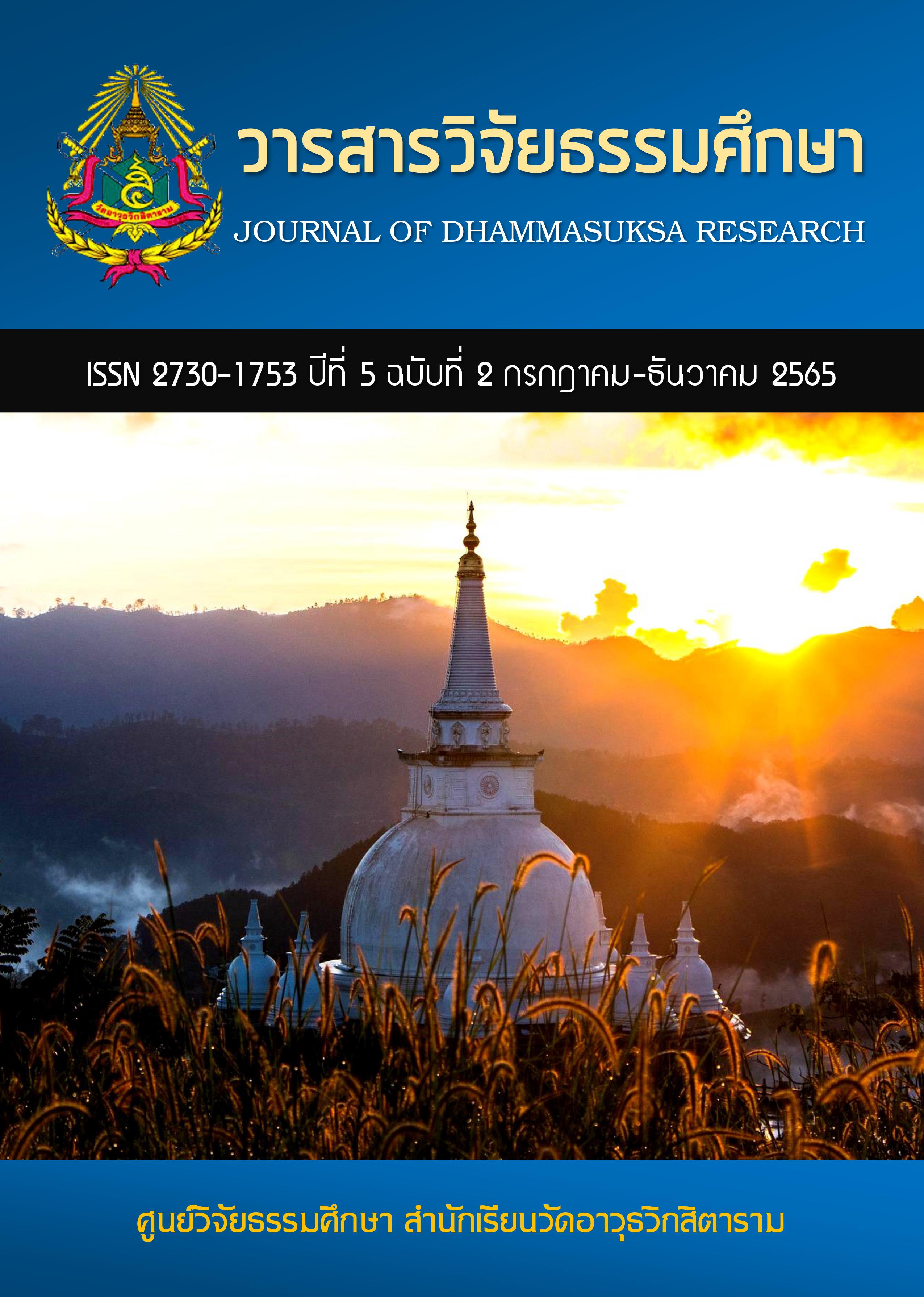Taoist philosophy in the science of Feng Shui of Development quality life
Keywords:
Taoism philosophy, Feng Shui science, Quality of life improvement post-modern, happiness, PhenomenologyAbstract
This article is intended to study the Taoist philosophy in feng shui that influences the development of quality of life. Which has the basis of philosophy of naturalism (Naturalism) to find the truth by qualitative research will focus on phenomena that occur naturally which is known as a phenomenal concept (Phenomenalism) on moral and ethical practices in the science of Feng Shui. The results showed that a happy life, a life that can adjust itself to the nature both physical nature and social nature, and can adapt nature to oneself without harming society and others. When the postmodern neo-medieval philosophical paradigm is carried out, values are transformed and the quality of life development becomes a common culture of the post-modern paradigm. Mid era it is the core culture of today's society. It's an anchor that isn't an attachment, that is, no matter what you do. But it also allows for diversity. Can vary according to area, race, nationality, and when the will of the post-modern neo-modern philosophical paradigm, the decision-making will is an important criterion. Inevitably there will be a corresponding ethical philosophy and ethical measures. People believe in improving their quality of life and act willingly. Because you can get real happiness from the practice to improve the quality of life improving the quality of life is therefore as valuable as the goal at the religious level. It is a post-modern philosophical paradigm religion. But is a religion that does not require members do not compete or believe that one is right the other party is all wrong. The development of quality of life is therefore a religious principle that seeks cooperation and is ready to help other religions as an important principle for living according to that religion.
References
จ่าง แซ่ตั้ง.(2516). คัมภีร์เต๋าเต้อจิง. กรุงเทพฯ: อักษรสยามการพิมพ์.
ทวีวัฒน์ ปุณฑริกวิวัฒน์. (2526). ศาสนาในประเทศจีน ธิเบต และญี่ปุ่น. กรุงเทพฯ: มหาวิทยาลัยมหิดล.
บุญศักดิ์ แสงระวี (แปลและเรียบเรียง). (2538). จวงจื๊อจอมปราชญ์. พิมพ์ครั้งที่ 6. กรุงเทพฯ: สำนักพิมพ์ ก.ไก่ .
ปกรณ์ ลิมปนุสรณ์ (แปลและเรียบเรียง). (2540). คัมภีร์เต๋าของจวงจื๊อ. กรุงเทพฯ: สำนักพิมพ์เคล็ดไทย.
. (2547). คัมภีร์เต๋าของเหลาจื่อ. กรุงเทพฯ: สำนักพิมพ์สร้างสรรค์.
ปานทิพย์ ประเสริฐสุด. (2521). ปรัชญาจีน. กรุงเทพฯ: มหาวิทยาลัยรามคำแหง.
พจนา จันทรสันติ. (2525). วิถีแห่งเต๋า. พิมพ์ครั้งที่ 3. กรุงเทพฯ: สำนักพิมพ์เคล็ดไทย.
ราชบัณฑิตยสถาน. (2540). พจนานุกรมศัพท์ปรัชญา อังกฤษ-ไทย ฉบับราชบัณฑิตยสถาน (แก้ไขเพิ่มเติม). พิมพ์ครั้งที่ 2. กรุงเทพฯ: ราชบัณฑิตยสถาน.
ส. ศิวรักษ์. (2518). ประวัติศาสตร์จีน. กรุงเทพฯ: ศึกษิตสยาม.
เสถียร โพธินันทะ .(2512). เมธีตะวันออก. กรุงเทพฯ: สำนักพิมพ์บรรณาคาร.
สุรัติ ปรีชาธรรม (แปลและเรียบเรียง). (2556). คัมภีร์จวงจื๊อ. พิมพ์ครั้งที่ 2. กรุงเทพฯ: สำนักพิมพ์โอเพ่น โซไซตี้ จำกัด.
ศรุตานนท์ ไรแสง. (2561). การศึกษาเชิงวิเคราะห์ทฤษฎีความรู้ในปรัชญาจวงจื้อ. สารนิพนธ์สาขาปรัชญา.บัณฑิตวิทยาลัย: มหาวิทยาลัยมหาจุฬาลงกรณราชวิทยาลัย.
Alan Watts. (1975). Tao: The Watercourse Way. New York; Pantheon Book.
A.C. Gramham. (1989). Chuang Tzu : The Inner Chapters. London : Unwin Paperbacks.
. (1989). Disputers of the Tao. La SalleIl: Open Court.
Allinson, Robert E. (1987). Chuang-Tzu for spiritual transformation: An analysis of the inner chapters.
Ames, Roger T. (1998). Wandering at Ease in the Zhuanzi. Buffalo New York: SUNY Press.
Brown, Simon. (1999). Essential Feng Shui: Your Practical Guide to Health, Wealth and Happiness. UK: Cassell Illustrated.
Chang, Chung-yuan. (1963). Creativity and Taoism. New york : Harper & Row.
Ch’en Ku Ying. (1977). Lao Tzu, Text, Notes and Comments. San Francisco: Chinese Materials Center Inc.
Essen, H.V. (2000). Fung Shui for the Southern hemisphere. Australia, Axiom Publishing.
Fishbein, and Ajzen. (1975). Belief Attitude Intention and Behavior: An Introduction to theory and Research. Mass: Addison-Wesley.
Karl Jaspers.(1966). The Great Philosophers. London: Rupert Hart-Davis.
Kellner, Douglas. (1992). Popular Culture and the Construction of Postmodern Identities. In Modernity and Identity, 141-177. Edited by Scott Lash and Jonathan Friedman (eds), Oxford, UK: Blackwell.
Lip, Evelyn . (1997). WHAT IS FENG SHUI. New York: Vintage Books.
Welch Holmes.(1963). Taoism: The Parting of the Way. Boston: Beacon Press.
Downloads
Published
How to Cite
Issue
Section
Categories
License
Copyright (c) 2022 Journal of Dhammasuksa Research

This work is licensed under a Creative Commons Attribution-NonCommercial-NoDerivatives 4.0 International License.



